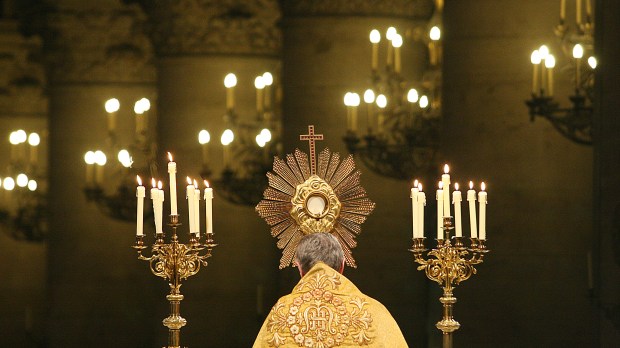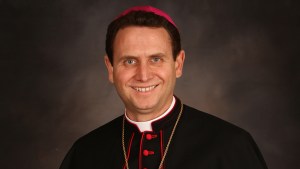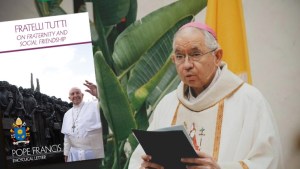After almost 50 years, the Catholic Church in America will hold a national Eucharistic congress in the summer of 2024.
The event will take place in Indianapolis, Bishop Andrew H. Cozzens announced Wednesday morning at a semi-annual meeting of the United States Conference of Catholic Bishops.
Bishop Cozzens, the bishops’ point man for a Eucharistic revival in the U.S., made the announcement after the Conference approved a new statement on the Eucharist. “The Mystery of the Eucharist in the Life of the Church” is meant to guide a revival in faith and devotion to the central sacrament of the Church.
The document, which some had seen initially as primarily a rebuke to Catholic political figures who support the legality of abortion, takes a much more spiritual tone, detailing the Church’s doctrine about the Eucharist. It received approval with an overwhelming majority of the bishops present in Baltimore.
The bishops voted 201-17, with five abstentions, to green-light the Eucharistic congress, to be held July 17-21, 2024. Cozzens said the hope is to have between 80,000 to 100,000 people in attendance. Attendance fees of roughly $300 will help pay for the estimated $28 million cost of the event. Fundraising is expected to help as well.
The Indianapolis event is being seen as a capstone of a three year Eucharistic revival campaign, which is due to begin on the Feast of Corpus Christi, June 19, 2022. Successive years will focus on Diocesan Renewal, Parish Renewal, and the National Eucharistic Congress, followed by ongoing revival.
Bishop Cozzens is chairman of the bishops’ Committee on Evangelization and Catechesis, which will launch a dedicated website in January, EucharisticRevival.org. He said that Formed.org, a project of the Augustine Institute, is offering free space on its own website for four years, where people can find catechetical resources on the Eucharist. Cozzens said the donation of space is worth about $1.2 million.
In addition, with funding from the McGrath Institute for Church Life at the University of Notre Dame, the bishops are able to commission a study on the beliefs of Catholics in America regarding the Eucharist. He said that there were “a lot questions about” the 2019 Pew Survey that showed a significant decline in belief in the Catholic doctrine of transubstantiation. Some observers have said that the Pew survey was poorly worded and doesn’t really understand Catholic belief about the Eucharist.
Our Sunday Visitor has pledged a four-year, $1 million grant in support of the Eucharistic revival, Bishop Cozzens announced. OSV is creating catechetical and devotional materials for the revival to help Catholics better understand the Church’s teaching on the Eucharist and experience Christ’s presence on the altar of every Catholic Church.
There was also a grant from the Knights of Columbus to do research and development for a national advertising strategy.
Eucharistic preachers
Bishop Cozzens’ committee is forming a team of some 50 Eucharistic preachers — priests who have been vetted by their bishops and will be available to preach about the Eucharist at diocesan events around the country.
Cozzens also spoke of the hope to offer small group formation for in-depth study of the Eucharist; to have a monstrance blessed by Pope Francis to take on a national “pilgrimage” to “bring the healing presence of Our Lord” especially to populations that are in need of healing, such as people affected by racism and those in prison.
“The last time there was a Eucharistic congress in the United States was in 1976,” said Cozzens. “I think it’s time to do one again.” Bishops applauded his sentiment.
After he outlined plans for the revival, Archbishop William E. Lori of Baltimore offered a plaudit. “Since you introduced the Eucharistic revival project it’s always been done in the spirit of opening people’s minds and hearts to the Gospel, to have a living encounter with the person of Jesus Christ, to open hearts to Christ, who loves us more than we can imagine, and to find in the Eucharist that point of encounter.”
Auxiliary Bishop William J. Muhm of the Archdiocese for Military Services offered a warning, though, suggesting that the committee might want to confer with the Republican and Democratic parties to make sure the congress is not overlapping with one of their political conventions that summer. Muhm said that should the congress accidentally coincide with one of the conventions, it might be interpreted as trying to send a message of some sort, thereby politicizing the Eucharist. Cozzens responded that he wasn’t sure the committee has much influence with either party and its convention planning.
Statement on the Eucharist
The statement on the Eucharist was approved by a vote of 222-8, with three abstentions.
Discussion before the vote included debate on adding or clarifying language to make certain points clearer. Bishop Jaime Soto of Sacramento, California, for example, felt that the document does not make it clear enough that Christ suffered and died on the cross in obedience to the will of God the Father.
“Jesus offered himself because the Father willed it, and obedience is part of the trinitarian harmony,” Soto said.
After the vote, Archbishop Joseph Naumann of Kansas City, Kansas, chairman of the bishops’ pro-life activities committee, spoke out in support of having a dialogue with Catholic politicians who support legal abortion and other measures contrary to Church teaching.
“I am not sure that we’ve taken seriously as bishops our responsibility for the care of the souls of these politicians — to really enter a dialogue,” Archbishop Naumann said.
During a press conference Monday evening, Bishop Cozzens said that the statement on the Eucharist will serve as a resource for the Eucharistic revival.
“The document is a beginning,” he said. “You would expect we would produce other catechetical resources. … It’s an excellent document, capturing the mystery of the Eucharist, and we will build on that document so people have the understanding of the Eucharistic life.”
Other business
Other items approved by the bishops on the third day of their Fall General Assembly included a new translation of a liturgical book, Holy Communion and Worship of the Eucharistic Mystery Outside Mass, and a new socially responsible investment strategy using the moral criteria of avoiding doing harm; actively working for change, and promoting the common good.
They agreed that conducting a review of their Charter for the Protection of Children and Young People needs to be done earlier than 2025, when it was originally planned. Amid discussion of this motion, Brooklyn, N.Y., Bishop Nicholas A. DiMarzio suggested that it include a review of what to do when priests are taken out of ministry for a significant period of time after being accused of sexual abuse, even though they are later cleared. DiMarzio himself recently was cleared of abuse allegations.
The bishops also voiced their position that it is opportune to advance on the local level the causes for beatification of three persons who could one day be declared to be saints: Charlene Richard and Auguste Pelafigue of Lafayette, Louisiana, and Joseph Dutton of Honolulu, Hawaii. They also voted to add an optional memorial for St. Teresa of Calcutta on the liturgical calendar for September 5, the anniversary of her death in 1997.



